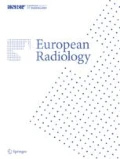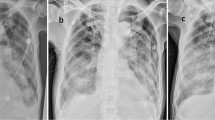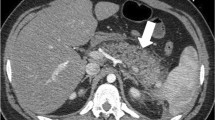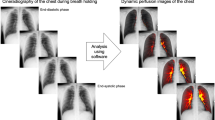Abstract
The combination of functional indices best reflecting the extent of emphysema is not known. High-resolution computed tomography (HRCT) studies of 106 patients with emphysema [men=71; median age=61 (range=26–86 years)] were reviewed and the extent of emphysema was quantified: (a) visually (emphysemavis) and (b) by automated estimation (emphysemaauto). Functional-morphologic relationships were compared for the two scoring systems, and a composite physiologic index (CPI) (providing the best fit of functional indices against emphysema extent) was derived. Emphysemavis and emphysemaauto were strongly correlated (r=0.90; p<0.0005), but the extent of emphysemavis was consistently greater (p<0.00005). Emphysemavis correlated most strongly with indices of gas transfer [percent predicted single-breath carbon monoxide diffusing capacity (Dlco) and alveolar volume (Kco); r=−0.70, both p<0.0005]. The combination of physiologic indices most representative of emphysema extent on CT (using visual or automated methods) consisted of Kco and forced expiratory volume in 1 s (FEV1) levels. The equation explanatory power was higher for visual scoring [emphysemavis=96.8-(0.67×% predicted Kco)-(0.41×% predicted FEV1); equation r 2=0.57] than automated estimation (equation r 2=0.48). Weighted combinations of Kco and FEV1 levels provide a CPI best reflecting morphologic emphysema extent. CPI has the potential to refine the stratification of patients in epidemiological and therapeutic studies.



Similar content being viewed by others
References
Cooper JD, Trulock EP, Triantafillou AN, Patterson GA, Pohl MS, Deloney PA, et al. (1995) Bilateral pneumectomy (volume reduction) for chronic obstructive pulmonary disease. J Thorac Cardiovasc Surg 109:106–116
Bingisser R, Zollinger A, Hauser M, Bloch KE, Russi EW, Weder W (1996) Bilateral volume reduction surgery for diffuse pulmonary emphysema by video-assisted thoracoscopy. J Thorac Cardiovasc Surg 112:875–882
Ciccone AM, Meyers BF, Guthrie TJ, Davis GE, Yusen RD, Lefrak SS, et al. (2003) Long-term outcome of bilateral lung volume reduction in 250 consecutive patients with emphysema. J Thorac Cardiovasc Surg 125:513–525
National Emphysema Treatment Trial (2001) Patients at high risk of death after lung-volume-reduction surgery. N Engl J Med 345:1075–1083
Nagai A, West WW, Thurlbeck WM (1985) The National Institutes of Health intermittent positive-pressure breathing trial: pathology studies II. Correlation between morphologic findings, clinical findings and evidence of expiratory air-flow obstruction. Am Rev Respir Dis 132:946–953
Fletcher CM, Hugh-Jones P, McNicol MW, Pride NB (1963) The diagnosis of pulmonary emphysema in the presence of chronic bronchitis. Q J Med 32:33–49
Nicklaus TM, Stowell DW, Christiansen WR, Renzetti AD, Jr. (1966) The accuracy of the roentgenologic diagnosis of chronic pulmonary emphysema. Am Rev Respir Dis 93:889–899
Laws JW, Heard BE (1962) Emphysema and the chest film: a retrospective radiological and pathological study. Br J Radiol 35:750–761
Thurlbeck WM, Simon G (1978) Radiographic appearance of the chest in emphysema. AJR Am J Roentgenol 130:429–440
Thurlbeck WM, Müller NL (1994) Emphysema: definition, imaging, and quantification. AJR Am J Roentgenol 163:1017–1025
Morgan MDL (1992) Detection and quantification of pulmonary emphysema by computed tomography: a window of opportunity. Thorax 47:1001–1004
Sider L, Dennis L, Smith LJ, Dunn MM (1987) CT of the lung parenchyma and the pulmonary function test. Chest 92:406–410
Kuwano K, MAtsuba K, Ikeda T, Murakami J, Araki A, Nishitani H, et al. (1990) The diagnosis of mild emphysema: correlation of computed tomography and pathology scores. Am Rev Respir Dis 141:169–178
Gevenois PA, de Maertelaer V, de Vuyst P, Zanen J, Yernault J-C (1995) Comparison of computed density and macroscopic morphometry in pulmonary emphysema. Am J Respir Crit Care Med 152:653–657
Gevenois PA, de Vuyst P, de Maertelaer V, Zanen J, Jacobovitz D, Cosio MG, et al. (1996) Comparison of computed density and microscopic morphometry in pulmonary emphysema. Am J Respir Crit Care Med 154:187–192
Müller NL, Staples CA, Miller RR, Abboud RT (1988) “ Density mask”: an objective method to quantitate emphysema using computed tomography. Chest 94:782–787
Bankier AA, de Maertelaer V, Keyzer C, Gevenois PA (1999) Pulmonary emphysema: subjective visual grading versus quantification with macroscopic morphometry and thin-section CT densitometry. Radiology 211:851–858
Gierada DS, Yusen RD, Pilgram TK, Crouch L, Slone RM, Bae KT, et al. (2001) Repeatability of quantitative CT indexes of emphysema in patients evaluated for lung volume reduction surgery. Radiology 220:448–454
Cederlund K, Berstrand L, Högberg S, Rasmussen E, Svane B, Aspelin P (2004) Visual grading of emphysema severity in candidates for lung volume reduction surgery: comparison between HRCT, spiral CT and “density-masked images. Acta Radiologica 43:48–53
Chabat F, Desai SR, Hansell DM, Yang GZ (2000) Gradient correction and classification of CT lung images for the automated quantification of mosaic attenuation pattern. J Comput Assist Tomogr 24:437–447
Chabat F, Yang GZ, Hansell DM (2003) Obstructive lung diseases: texture classification for differentiation at CT. Radiology 228:871–877
Austin JHM, Müller NL, Friedman PJ, Hansell DM, Naidich DP, Remy-Jardin M, et al. (1996) Glossary of terms for computed tomography of the lungs: recommendations of the nomenclature committee of the Fleischner society. Radiology 200:327–331
Quanjer PH (1993) Standardized lung function testing. Eur Respir J 6(suppl):1–100
Chinn S (1991) Repeatability and method comparison. Thorax 46:454–456
Park SS, Janis M, Shim CS, Williams MH, Jr. (1970) Relatioship of bronchitis and emphysema to altered pulmonary function. Am Rev Respir Dis 102:927–936
Sakai F, Gamsu G, Im J-G, Ray CS (1987) Pulmonary function abnormalities in patients with CT-determined emphysema. J Comput Assist Tomogr 11:963–968
Klein JS, Gamsu G, Webb WR, Golden JA, Müller NL (1992) High resolution CT diagnosis of emphysema in symptomatic patients with normal chest radiographs and isolated low diffusing capacity. Radiology 182:817–821
Gelb AF, Schein M, Kuei J, Tashkin DP, Müller NL, Hogg JC, et al. (1993) Limited contribution of emphysema in advanced chronic obstructive pulmonary disease. Am Rev Respir Dis 147:1157–1161
Eda S, Kubo K, Fujimoto K, Matsuzawa Y, Sekiguchi M, Sakai F (1997) The relations between expiratory chest CT using helical CT and pulmonary function tests in emphysema. Am J Respir Crit Care Med 155:1290–1294
Nishimura K, Murata K, Yamagishi M, Itoh H, Ikeda A, Tsukino M, et al. (1998) Comparison of different computed tomography scanning methods for quantifying emphysema. J Thorac Imaging 13:193–198
Wells AU, Desai SR, Rubens MB, Goh NSL, Cramer D, Nicholson AG, et al. (2003) Idiopathic pulmonary fibrosis: a composite physiologic index derived from disease extent observed by computed tomography. Am J Respir Crit Care Med 167:962–969
Hansell DM, Rubens MB, Padley SPG, Wells AU (1997) Obliterative bronchiolitis: individual CT signs of small airways disease and functional correlation. Radiology 203:721–726
Cleverley JR, Desai SR, Wells AU, Koyama H, Eastick S, Schmidt MA, et al. (2000) Evaluation of patients undergoing lung volume reduction surgery: ancillary information available from computed tomography. Clin Radiol 55:45–50
Desai SR, Wells AU, Rubens MB, du Bois RM, Hansell DM (2003) Traction bronchiectasis in cryptogenic fibrosing alveolitis: associated computed tomographic features and physiological significance. Eur Radiol 13:1801–1808
Adams H, Bernard MS, McConnochie K (1991) An appraisal of CT pulmonary density mapping in normal subjects. Clin Radiol 43:238–242
Kemerink GJ, Lamers RJS, Thelissen GRP, van Engelshoven JMA (1995) Scanner conformity in CT densitometry of the lungs. Radiology 197:749–752
Kemerink GJ, Lamers RJS, Thelissen GRP, van Engelshoven JMA (1996) CT-densitometry of the lungs: scanner performance. J Comput Assist Tomogr 20:24–33
Kemerink GJ, Kruize HH, Lamers RJS, van Engelshoven JMA (1997) CT lung densitometry: dependence of CT number histograms on sample volume and consequences for scan protocol comparability. J Comput Assist Tomogr 21:948–954
Stoel BC, Vrooman HA, Stolk J, Reiber JHC (1999) Sources of error in lung densitometry with CT. Invest Radiol 34:303–309
Boedecker KL, McNitt-Gray MF, Rogers SR, Truong DA, Brown MS, Gjertson DW, et al. (2004) Emphysema: effects of reconstruction algorithm on CT imaging measures. Radiology 232:295–301
Gurney JW, Jones KK, Robbins RA, Gossman GL, Nelson KJ, Daughton D, et al. (1992) Regional distribution of emphysema: correlation of high-resolution CT with pulmonary function tests in unselected smokers. Radiology 183:457–463
Author information
Authors and Affiliations
Corresponding author
Rights and permissions
About this article
Cite this article
Desai, S.R., Hansell, D.M., Walker, A. et al. Quantification of emphysema: a composite physiologic index derived from CT estimation of disease extent. Eur Radiol 17, 911–918 (2007). https://doi.org/10.1007/s00330-006-0369-0
Revised:
Accepted:
Published:
Issue Date:
DOI: https://doi.org/10.1007/s00330-006-0369-0




